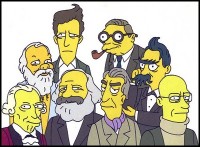PACTISS recommends

Where science meets art. The only necessary and sufficient book store in Melbourne.
Hope our friends enjoy the new look and feel – now optimised for mobile devices for access on the go.

PEOPLE
-
Coordinator: Peter Ellerton
Web guy: Jason Etheridge RESOURCE COLLECTIONS
NEW RESOURCES
-
- A nice Philosophy of Mind summary
- The power of categorical logic
- What exactly is the scientific method and why do so many people get it wrong?
- Paralympic athletes faster than olympic athletes — what does this tell us about difference?
- Logic: if + then = why? How can we understand the power of logic?
- How do we ensure we are exposed to new ideas? A parody with bite.
- A Life of Meaning (Reason Not Required) – What is the nature of our relationship with reason?
- Can you name this cognitive bias?
- By what measures can we value human life?
- Teaching philosophy improves standardised scores
- Are we in control of our own decisions?
- Neuroscience and education: myths and messages
- Free will is not as free as we think – and that’s ok.
- Where’s the Proof in Pseudoscience?
- Science in the lead?
RANDOM POSTS
-
- Dilbert- Collection of logical fallacies
- The Eternal Value of Privacy
- Banning Religion - An interesting hypothetical
- Honour Killings in India
- Burka ban a headache for a liberal society
- Indian High Court Rules Astrology is a Science
- Hypothesis forming excercise
- Are we individual or social creatures?
- Evolution and the Second Law of Thermodynamics
- Philosophy of Mind essay topic
USEFUL RSS FEEDS
 Philosopher’s Zone
Philosopher’s Zone NYTimes – The Stone
NYTimes – The Stone Philosophy Now
Philosophy Now RSA Animate
RSA Animate- The Green Corridors Initiative
- Governance governing government
- Why print money when we can print wealth?
- Building a resilient health and care system
- We'll always have Paris?
- Experimentation and equity in global cities
- Technology-enabled deliberative democracy
- Healthier placemaking
- Creating a sovereign wealth fund in Wolverhampton
- Economic recovery and climate action
 Scientific American – Mind and Brain
Scientific American – Mind and Brain- Kindness Can Have Unexpectedly Positive Consequences
- It's the Bass That Makes Us Boogie
- Subliminal Cues, Precisely Timed, Might Help People Forget Bad Experiences
- Severe COVID May Cause Brain Changes Similar to Aging
- Autism Treatment Shifts Away from 'Fixing' the Condition
- Fatherhood Changes Men's Brain, according to Before-and-After MRI Scans
- Many People with Bipolar Disorder Use Cannabis. It May Sometimes Help
- Why Social Media Makes People Unhappy--And Simple Ways to Fix It
- People Shopping for 'Meaning' Buy Cheaper Goods
- Pregnancy Changes the Brain, Possibly Promoting Bonding with a Baby
 TED talks
TED talks- Can the metaverse bring us closer to wildlife? | Gautam Shah
- The billion-dollar pollution solution humanity needs right now | Stacy Kauk
- Are video calls the best we can do in the age of the metaverse? | Josephine Eyre
- How great leaders take on uncertainty | Anjali Sud and Stephanie Mehta
- How Indigenous guardians protect the planet and humanity | Valérie Courtois
- How to tap into your awareness -- and why meditation is easier than you think | Yongey Mingyur Rinpoche
- Demystifying the wild world of crypto | Laura Shin
- How can we escape soaring energy bills? Stop using fossil fuels | Tessa Khan
- A disability-inclusive future of work | Ryan Gersava
- How to tackle the stigma of living with HIV | Gareth Thomas
THEMED RESOURCES
- December 2022MonTueWedThuFriSatSun282930123456789101112131415161718192021222324252627282930311
Category Archives: Booklets, Handouts and Worksheets
The Ethics of Robot Cars
How about robot cars with ethics settings adjusted to suite the driver? Here’s a Terrible Idea: Robot Cars With Adjustable Ethics Settings Here’s a PDF
Posted in Booklets, Handouts and Worksheets, Ethics and Moral Philosophy, Media Articles, Cartoons
Comments Off on The Ethics of Robot Cars
Another resource for Fallacies of Reasoning
Great resource and very accessible to students.
Posted in Booklets, Handouts and Worksheets, Critical Thinking, Media Articles, Cartoons, Web links
Comments Off on Another resource for Fallacies of Reasoning
Science and Conspiracy
A useful resource produced by NASA debunking claims that the moon landings were faked. Debunking moon landing conspiracies
Posted in Booklets, Handouts and Worksheets, Critical Thinking, Media Articles, Cartoons
Comments Off on Science and Conspiracy
Fallacies Poster
A lovely job from http://yourlogicalfallacyis.com/ please visit the site for interactive presentation.
Posted in Booklets, Handouts and Worksheets, Critical Thinking
Comments Off on Fallacies Poster
The Language of Science
Listen and learn: the language of science and scepticism Peter Ellerton Making sure what’s intended is what’s heard can be more difficult than it seems. Melvin Gaal (mindsharing.eu) As scientists, one of our responsibilities should be to promote clarity. A lot … Continue reading
Posted in Booklets, Handouts and Worksheets, Critical Thinking, Media Articles, Cartoons, Philosophy of Science
Comments Off on The Language of Science
Philosophy — What’s the Use?
Are you looking to see why teaching philosophy is important? Another great article from NYTimes The Stone Almost every article that appears in The Stone provokes some comments from readers challenging the very idea that philosophy has anything relevant to … Continue reading
Posted in Booklets, Handouts and Worksheets, Critical Thinking
Comments Off on Philosophy — What’s the Use?
Another Double Blind Test surprise
Stradivarius Fails Sound Test Versus Newbie Violins Download pdf (from sciam) Can you tell the difference between modern violins and antiques crafted by Italian masters? Don’t feel too bad – expert players can’t do it either. In a double-blind test, 21 experienced … Continue reading
Posted in Booklets, Handouts and Worksheets, Critical Thinking, Media Articles, Cartoons, Philosophy of Science
Comments Off on Another Double Blind Test surprise
When Should Science be Censored?
Calls to censor details of potential killer flu via ABC News The suppression of breakthrough research into deadly bird flu strains has been labelled scientific censorship by some, but others say it is a necessary step to prevent a possible … Continue reading
Posted in Booklets, Handouts and Worksheets, Ethics and Moral Philosophy, Media Articles, Cartoons, Social and Political Philosophy
Comments Off on When Should Science be Censored?
The Backfire Effect
When people believe more strongly in something AFTER they have been given information that refutes it…. Good explanation here http://youarenotsosmart.com/2011/06/10/the-backfire-effect/ And paper by Brendan Nyhan here (pdf). Abstract below. An extensive literature addresses citizen ignorance, but very little research focuses … Continue reading
Posted in Booklets, Handouts and Worksheets, Critical Thinking, Media Articles, Cartoons
Comments Off on The Backfire Effect
Suing for Being Born
ISRAELI children with birth defects are increasingly suing the medical authorities for ever allowing them to be born. The rise in such “wrongful life” lawsuits, which the medical profession estimates at 600 since the first case in 1987, has prompted … Continue reading
Animal Actors – Animal Rights, Human Perceptions
Chimpanzees Should Not Be Used in TV or Movies (via Scientific American) Does the use of chimps in movies distort the conservation message? By Jason G. Goldman | October 12, 2011 | 3 Lots of people mistake bonobos for chimpanzees, despite the fact that they’re really … Continue reading
Why do humans reason? Arguments for an argumentative theory
Great paper on Reasoning Why Do Humans Reason? (pdf) Abstract and authors below… Abstract: Reasoning is generally seen as a means to improve knowledge and make better decisions. However, much evidence shows that reasoning often leads to epistemic distortions and poor … Continue reading
Tips on Writing a Philosophy Paper/Essay
A nice overview from Douglas W. Portmore Tips on writing a philosophy paper (pdf) The full text is below…
Developing critical thinking skills
A useful handout that talks about reading, writing and thinking critically with examples of how to achieve this. via http://sydney.edu.au/stuserv/documents/learning_centre/critical.pdf Critical Thinking Skills (pdf)
Critical Thinking – An Introduction (Alec Fisher)
This ebook is widely available for download on the web. I got it here www.axzopress.com/downloads/pdf/1560526483pv.pdf Critical thinking introduction (pdf) A good resource for referencing what we mean by critical thinking.
What’s logic got to do with it? – Some of the greatest flashes of scientific inspiration were sparked by utterly illogical thinking.
POPULAR belief has it that science is the preserve of logical Mr Spocks. A great scientific discovery must surely spring from a series of logical steps, each taken coolly and calmly, in the rational order. But take some time to … Continue reading
Top Ten Evolution Myths – and how we know it really happened (pdf)
Often misunderstandings about evolution are really misunderstandings about how science operates. This document deals with both rather nicely. Philosophy of Science. From the Skeptics Society. Top Ten Evolution Myths (pdf)
Hooked on Horoscopes (pdf)
We may not be able to persuade people that astrology and graphology are nonsense, but psychology, with the help of a showman, reveals why they are so popular. The Barnum effect. Psychology and critical thinking. Hooked on horoscopes (pdf)
Posted in Booklets, Handouts and Worksheets, Critical Thinking
Tagged Peter Ellerton
Leave a comment
Consciousness – science tackles the self (pdf)
We know that we are aware of ourselves. But we don’t know how. And we are not even sure why. The answers may lie in the physical processes of consciousness 01 April 1989 by SUSAN BLACKMORE New Scientists Magazine issue … Continue reading
Teaching the Nature of Science
Three Critical Questions By Randy L. Bell, Ph.D. Teaching the Nature of Science
